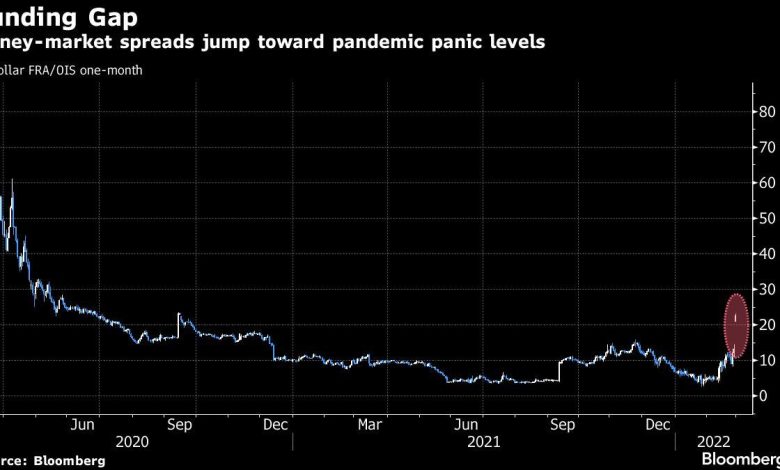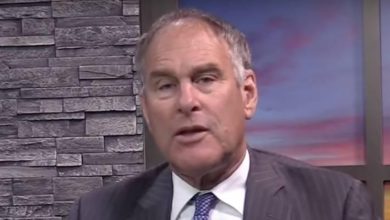‘Financial War’ Sparks Money Market Calls for Emergency Fixes

(Bloomberg) —
Most Read from Bloomberg
Money markets are showing the most stress since the early days of the pandemic as traders race for dollars in the wake of toughened sanctions against Russia, prompting calls for help from central banks.
The cost of converting both euro and yen payments into dollars using three-month cross-currency basis swaps hit the most since March 2020. The gap between future Libor and Federal Reserve rates, a key gauge of funding stress known as the FRA/OIS spread, also widened for one-month contracts by the most since March 2020.
The gyrations suggest concerns that dollar funding costs could increase amid sanctions on Russia’s economy and central bank. The decision to exclude various Russian lenders from the SWIFT messaging system could result in missed payments, and prompt monetary authorities to supply the market with dollars, according to Credit Suisse Group AG strategist Zoltan Pozsar.
“This is in effect a financial war now,” said Deutsche Bank AG analysts including Jim Reid, who also expect central bank measures. “The first-round impact of this news is likely to be turmoil in Russian markets today and a funding crisis. This will likely impact the global market for dollar funding.”
The moves in funding markets have similarities to the global run on the greenback triggered by the coronavirus pandemic, though not on the same scale. That pushed the Federal Reserve to step in as the lender of last resort through swap lines, which eased a dash for dollars. Some swap lines between the Fed and major central banks are still in place, while others have been closed after the pandemic distortions receded.
The Fed in 2021 established a repurchase agreement facility for foreign and international monetary authorities, known as FIMA, to help alleviate pressures in global dollar funding markets.
“We are likely to see some emergency measures including EUR and USD swap lines in the coming days,” said Mohit Kumar, a London-based managing director of interest-rate strategy at Jefferies. “The immediate concerns of central banks would be to maintain a proper functioning of the funding markets and prevent any stress in the banking system.”
Russia had about $300 billion of foreign currency held offshore, enough to disrupt money markets if frozen by sanctions or moved suddenly to avoid them, Credit Suisse Group AG estimated last week. Russian markets were paralyzed and traders struggled to price the ruble on Monday as the stress of sanctions shook the country’s financial system.
The dislocations added to concerns that the impact of the Ukraine crisis is piling stress on fixed-income markets, which were already showing signs of dysfunction as the Fed and its peers accelerated plans to tighten policy.
“Details on sanctions were fairly vague so the market will be looking for more clarity, but there is no doubt the goal of the sanctions is to drive a liquidity crisis within the Russian economy,” said Prashant Newnaha, an Asia-Pacific rates strategist at TD Securities. “The moves in front-end basis aren’t too surprising, a classic risk-off move, while spreads are wide and liquidity thin.”
Three-month euro-dollar basis — which helps govern costs for traders to swap interest rates across currencies — fell as much as 26 basis points to minus 49.5 basis points. The equivalent measure for Japan’s yen fell as much as 29 basis points to minus 64 basis points.
(Updates with chart, Deutsche Bank comments in fourth paragraph and context throughout.)
Most Read from Bloomberg Businessweek
©2022 Bloomberg L.P.
Source link





